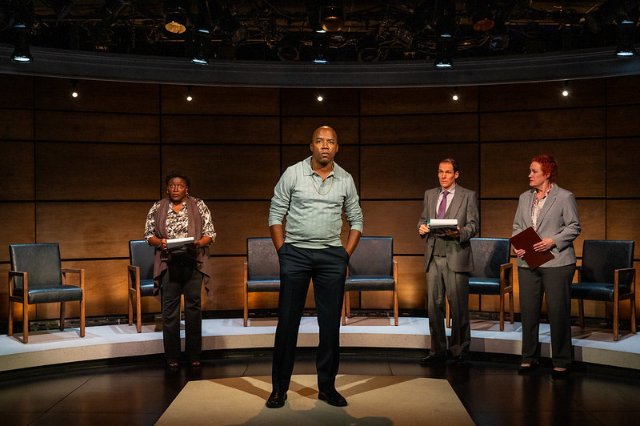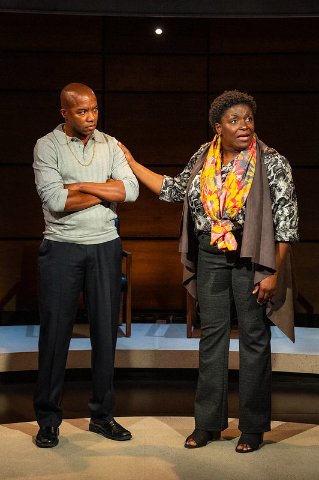Mark St Germain Explores Forgiveness
World Premiere for Barrington Stage Company
By: Charles Giuliano - Aug 04, 2024
Forgivness
By Mark St. Germain
Directed by Ron Lagomarsino
World Premiere
Scenic design Brian Prather, costume design Dina El-Aziz, lighting design Reza Behjat and sound design Brendan Aanes, Production Stage Manager Leslie Sears.
Cast: Joey Collins, Darlene Hope, Rodney Hicks, Peggy Pharr Wilson
Barrington Stage Company
Mark St. Germain Stage
Pittsfield, Mass.
July 30-August 2
Forgivness is the 17th production for Barrington Stage Company by playwright Mark St. Germain. It is the second collaboration with the director Ron Lagomarsino. Last year they presented The Happiest Man on Earth which has gone on to regional productions.
While St. Germain is known for biographical based work, Freud’s Last Session, Becoming Dr. Ruth, the new work is unlike any of his prior oeuvre.
Inspired by a newspaper article, Forgiveness is set in Minnesota where prisoners are allowed to plead their case in front of the Governor, in a bid to be returned to society. In this interactive production, audiences help determine who is worthy of forgiveness.
As he told me, the four cases that comprise this one act play he witnessed during a hearing. Working with 500 pages of transcript he changed names and identities to protect individuals while the enactments are true to reality.
The effective and powerful play is interactive as, after each segment, the audience votes to Dismiss or Pardon by holding up signs. At the end the audience is given the decisions of the parole board. Two pardons are granted and two denied. In one instance the audience was unanimous on a recommendation to pardon while the Governor and two others dismissed.
In order to qualify for this process individuals must have completed their sentences and been out of prison for a minimum of five years. In this play the average was closer to a decade. They are given ten minutes to plea their case and may call witnesses to support their merit. Victims and their families are also allowed to make statements.
As directed by Lagomarsino there are brilliant nuances as the four actors portray both the petitioners and the parole board. The actors were astonishingly skilled and effective at playing both sides of the cases.
On the intimate St. Germain Stage Brian Prather has created a platform with curved forum evoking the austerity of a court room. There is a dominance of wood framing. The actors negotiate this formal space with fluid ease.
Since this is not a court of law there is no swearing in. It is presumed that the petitioners are guilty of felonies. What is explored is the key issue of remorse and reform. In wiping clean the conviction and restoring full rights, such as voting, bearing arms, and unrestricted travel, the parole board must be convinced that the applicant will not be a repeat offender. They have full case files to ask probing and decisive questions.
The fact that we have to vote was a device that assured our full and rapt attention. I have never felt more involved in an evening of theatre. That was triggered by the device that my opinion, there and then, truly mattered. There was also the surprise of how the audience responded. Some votes were mixed while shockingly, the unanimous one, a case of second degree murder, was dismissed.
You had a bad feeling about the assault charges against Rodney Hicks. He was portrayed as a volatile black man who had turned his life around. Or has he? After release from prison there was a road rage incident. I was concerned that racism motivated voting against him. Ultimately his case was denied.
We then experienced Hicks as a smooth and sophisticated member of the board asking apt and probing questions. The director provided him with guidelines for dramatically different body language, elocution, and gestures for the different roles.
Peggy Pharr Wilson is a stalwart of BSC and we have marveled at her many performances. Here she was an arsonist who out of spite and revenge torched the closet of an estranged friend. In a nervous presentation, shuffling cue cards and asking if she is within her allotted time, she describes having benefited from incarceration. She took full advantage of opportunities and programs for rehabilitation.
With withering insight Hicks points out that she is fortunate that the fire was contained. It might have spread and resulted in multiple deaths. On this point her defense is weak and uncompelling.
We see another side of Pharr Wilson making an outraged victim statement with devastating rage and damming insight. There can be no forgiveness for the loss of a loved one. We are empathetic to mitigating circumstances. The mother, Darlene Hope, killed to protect the threat on her son and displays complete rehabilitation.
The offender played by Joey Collins is a gifted musician who sexually assaulted his female students. Travel restrictions have destroyed what might have been a brilliant career. As a registered sex offender he must disclose this to employers and students. By far he was the most educated and articulate of the offenders. Trusting him is a tough call and he is probed deeply. The decision might easily have gone either way.
It was an edge of your seat evening of theatre. Mark St. Germain, to my mind an outstanding and bankable playwright, has never been better. This production hit all the right notes and is likely to travel far and wide from here.




